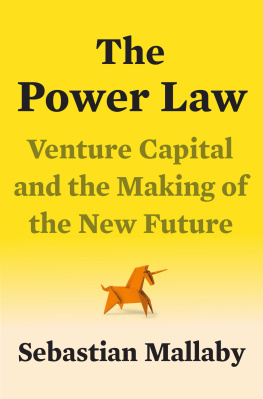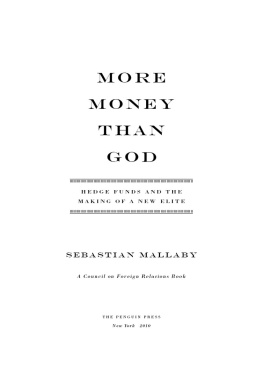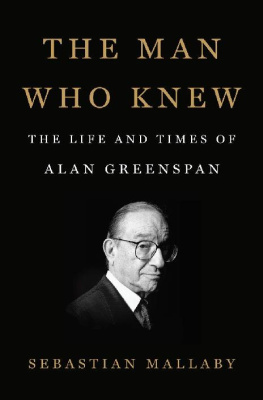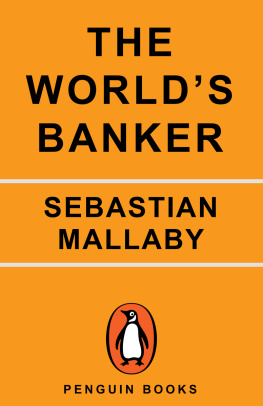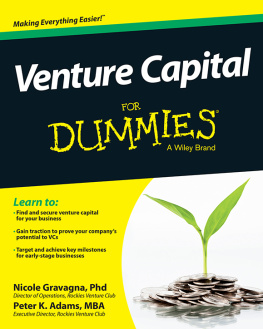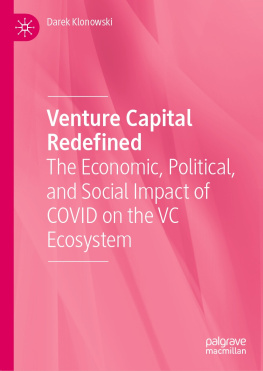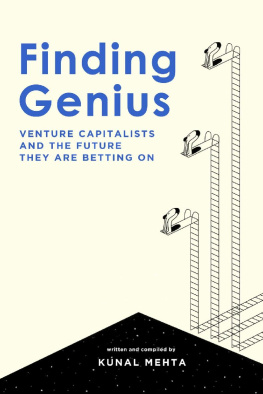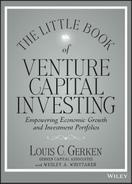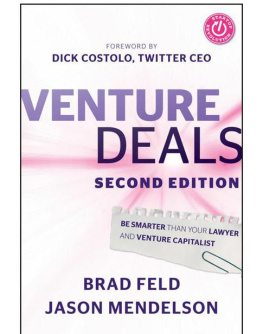Sebastian Mallaby - The Power Law : Venture Capital and the Making of the New Future
Here you can read online Sebastian Mallaby - The Power Law : Venture Capital and the Making of the New Future full text of the book (entire story) in english for free. Download pdf and epub, get meaning, cover and reviews about this ebook. year: 2022, publisher: Penguin Publishing Group, genre: Detective and thriller. Description of the work, (preface) as well as reviews are available. Best literature library LitArk.com created for fans of good reading and offers a wide selection of genres:
Romance novel
Science fiction
Adventure
Detective
Science
History
Home and family
Prose
Art
Politics
Computer
Non-fiction
Religion
Business
Children
Humor
Choose a favorite category and find really read worthwhile books. Enjoy immersion in the world of imagination, feel the emotions of the characters or learn something new for yourself, make an fascinating discovery.
- Book:The Power Law : Venture Capital and the Making of the New Future
- Author:
- Publisher:Penguin Publishing Group
- Genre:
- Year:2022
- Rating:5 / 5
- Favourites:Add to favourites
- Your mark:
- 100
- 1
- 2
- 3
- 4
- 5
The Power Law : Venture Capital and the Making of the New Future: summary, description and annotation
We offer to read an annotation, description, summary or preface (depends on what the author of the book "The Power Law : Venture Capital and the Making of the New Future" wrote himself). If you haven't found the necessary information about the book — write in the comments, we will try to find it.
The Power Law : Venture Capital and the Making of the New Future — read online for free the complete book (whole text) full work
Below is the text of the book, divided by pages. System saving the place of the last page read, allows you to conveniently read the book "The Power Law : Venture Capital and the Making of the New Future" online for free, without having to search again every time where you left off. Put a bookmark, and you can go to the page where you finished reading at any time.
Font size:
Interval:
Bookmark:
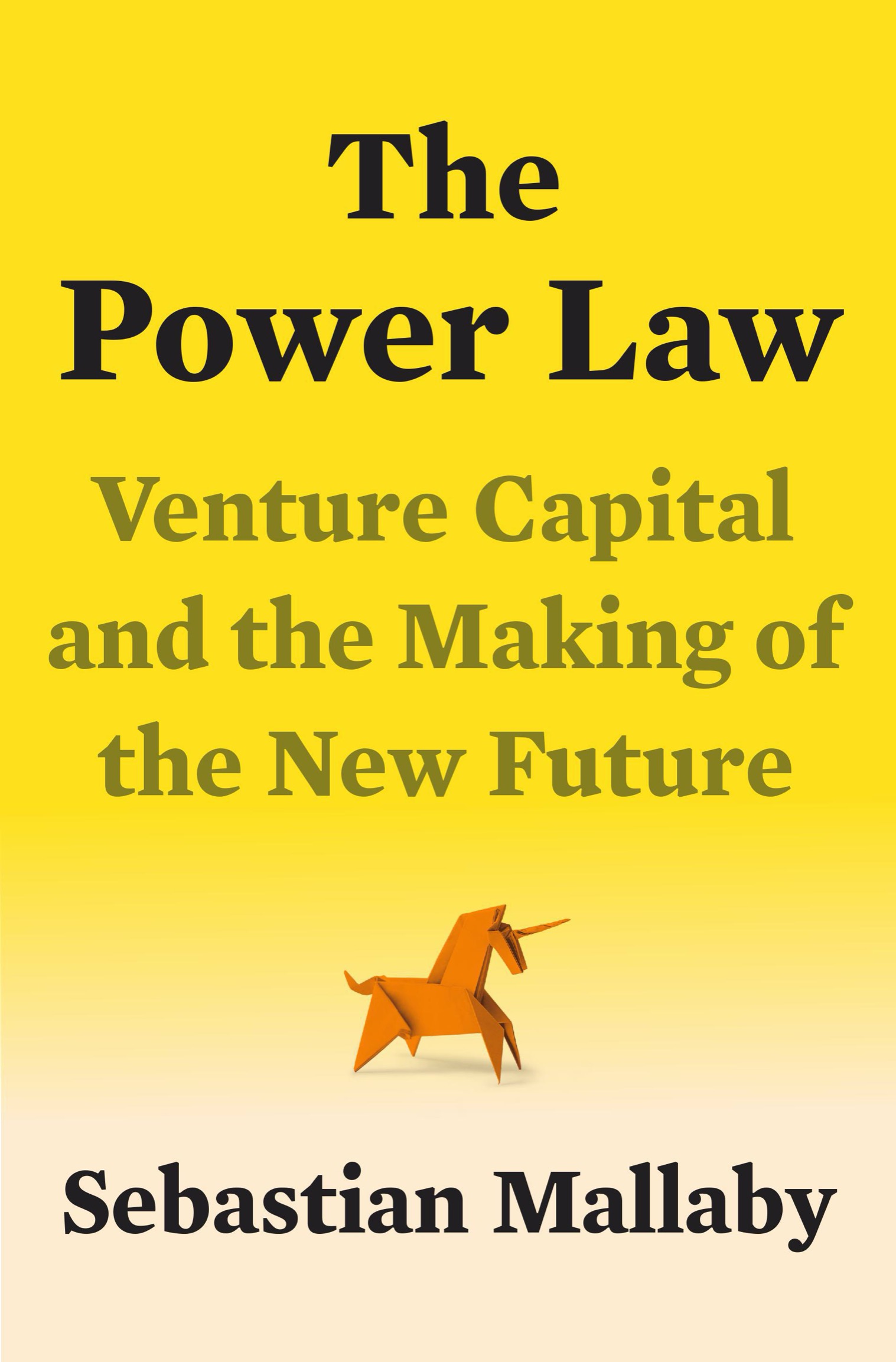
The Man Who Knew
More Money Than God
The Worlds Banker
After Apartheid
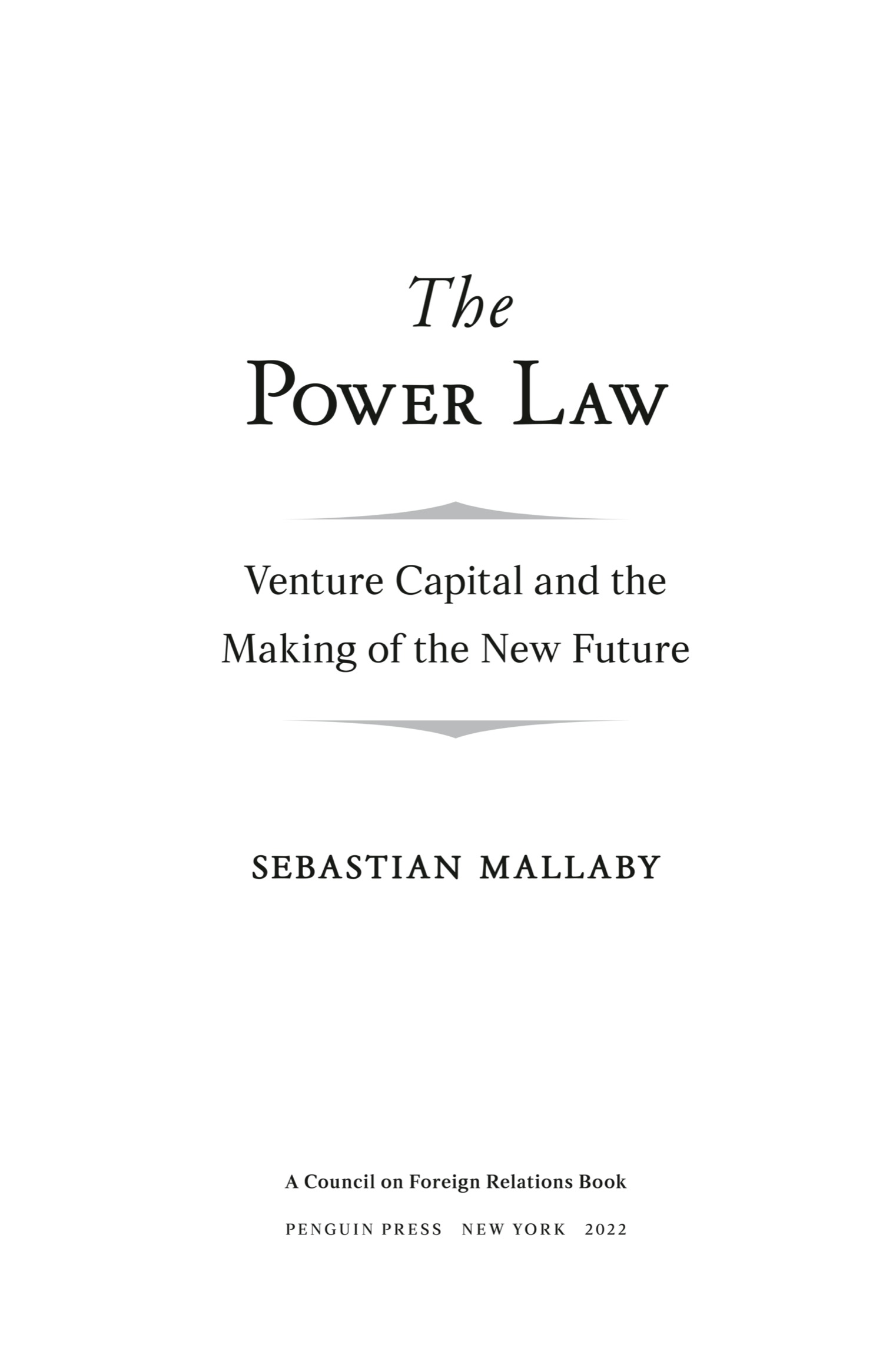
PENGUIN PRESS
An imprint of Penguin Random House LLC
penguinrandomhouse.com
Copyright 2022 by Sebastian Mallaby
Penguin supports copyright. Copyright fuels creativity, encourages diverse voices, promotes free speech, and creates a vibrant culture. Thank you for buying an authorized edition of this book and for complying with copyright laws by not reproducing, scanning, or distributing any part of it in any form without permission. You are supporting writers and allowing Penguin to continue to publish books for every reader.
Photo Credits:
, right: PETER EARL MCCOLLOUGH/The New York Times/Redux
LIBRARY OF CONGRESS CATALOGING-IN-PUBLICATION DATA
Names: Mallaby, Sebastian, author.
Title: The power law : venture capital and the making of the new future / Sebastian Mallaby.
Description: New York : Penguin Press, 2022. | A Council on Foreign Relations Book. | Includes bibliographical references and index. | Identifiers: LCCN 2021038348 (print) | LCCN 2021038349 (ebook) | ISBN 9780525559993 (hardcover) | ISBN 9780525560005 (ebook)
Subjects: LCSH: Venture capitalCaliforniaSan Francisco Bay Area. | High-technology industriesFinance. | New business enterprisesFinance. | Technological innovationsEconomic aspects.
Classification: LCC HG4963 .M334 2022 (print) | LCC HG4963 (ebook) | DDC 332/.041540973dc23
LC record available at https://lccn.loc.gov/2021038348
LC ebook record available at https://lccn.loc.gov/2021038349
Cover design: Christopher Brian King
Cover image: Dina Belenko / Shutterstock
Book design by Daniel Lagin, adapted for ebook by Shayan Saalabi
The Council on Foreign Relations (CFR) is an independent, nonpartisan membership organization, think tank, and publisher dedicated to being a resource for its members, government officials, business executives, journalists, educators and students, civic and religious leaders, and other interested citizens in order to help them better understand the world and the foreign policy choices facing the United States and other countries. Founded in 1921, CFR carries out its mission by maintaining a diverse membership, including special programs to promote interest and develop expertise in the next generation of foreign policy leaders; convening meetings at its headquarters in New York and in Washington, DC, and other cities where senior government officials, members of Congress, global leaders, and prominent thinkers come together with CFR members to discuss and debate major international issues; supporting a Studies Program that fosters independent research, enabling CFR scholars to produce articles, reports, and books and hold roundtables that analyze foreign policy issues and make concrete policy recommendations; publishing Foreign Affairs, the preeminent journal of international affairs and U.S. foreign policy; sponsoring Independent Task Forces that produce reports with both findings and policy prescriptions on the most important foreign policy topics; and providing up-to-date information and analysis about world events and American foreign policy on its website, www.cfr.org.
The Council on Foreign Relations takes no institutional positions on policy issues and has no affiliation with the U.S. government. All views expressed in its publications and on its website are the sole responsibility of the author or authors.
pid_prh_6.0_139089994_c0_r0
To Zanny

Not far from the headquarters of Silicon Valleys venture-capital industry, which is clustered along Palo Altos Sand Hill Road, Patrick Brown strode out into his yard on the Stanford University campus. Atop a little hill behind his house, Brown got down on his hands and knees, a shaggy fifty-four-year-old professor in a T-shirt, peering at the vegetation through rounded glasses. Proceeding delicately, like a detective collecting samples that might yield a vital clue, Brown began digging out the roots of some wild clover plants. It might impress the ordinary gardener to know that those roots would soon yield $3 million.
Brown was one of the worlds leading geneticists. In 1995, his lab had published pioneering work on DNA microarrays, which help distinguish between normal and cancerous tissue. He had been elected to the National Academy of Sciences and the National Academy of Medicine. He was the recipient of a Howard Hughes award, which guaranteed no-strings-attached research funding. But his objective on that hilltop had nothing to do with genetics. The year was 2010, and Brown was using a sabbatical to plot the downfall of the meat-industrial complex.
A friend had set him on this path by means of a stray comment. Possessed of a keen environmental conscience, Brown had been worrying that animal husbandry occupied one-third of the worlds land, causing significant greenhouse gas emissions, water degradation, and a loss of biodiversity. The planet was clearly going to need a better kind of food for the growing population of the twenty-first century. Then Browns friend mentioned that if you could make a vegetarian burger that tasted better than a beef burger, the free market would magically take care of the problem. Adventurous restaurants would serve it, and then McDonalds would serve it, and pretty soon you could eliminate meat from the food system.
The more Brown pondered this, the more he grew agitated. If you could make a yummier vegetarian burger? Of course you could make a yummier vegetarian burger! Why was nobody treating this as a solvable problem? People just figured we have this insanely destructive system and its just never going to go away, Brown fumed. They thought, Bummer, but there you are.
In most places and at most points in human history, Browns epiphany would have been inconsequential. But, as Brown himself reflected later, he had the very good fortune of living in the epicenter of venture capital. Because Stanford sat at the heart of Silicon Valley, its golf course laid out along the edge of Sand Hill Road, Brown was digging up his yard with a clear purpose. Those clover roots contained heme, an iron-carrying molecule found in hemoglobin, which gives blood its red color. If Brown could show how this plant molecule could mimic the properties of bloody meat, there was a good chance that a venture capitalist would fund a plantburger company.
Brown dissected the clover roots with a razor blade and blended them up to extract and culture the juices. Pretty soon, he had what he needed to fashion a vegetarian burger that smelled and sizzled and dripped and squished like 100 percent Grade A beef. I got to a point where, though I didnt have much data, Id enough to go and talk to some venture-capital companiesof which there are a ridiculous number in Silicon Valleyand hit them for some money.
A scientist friend mentioned that Vinod Khosla, a venture capitalist who ran the eponymous Khosla Ventures, was interested in environmentally friendly, cleantech projects. What he didnt mention was that Khosla was also a preacher of the Valleys most bracing creed: the belief that most social problems can be ameliorated by technological solutions, if only inventors can be goaded to be sufficiently ambitious. All progress depends upon the unreasonable man, the creatively maladjusted, Khosla declared, borrowing eclectically from George Bernard Shaw and Martin Luther King Jr. Khosla wanted radical dreams, the bolder and more improbable the better.
Font size:
Interval:
Bookmark:
Similar books «The Power Law : Venture Capital and the Making of the New Future»
Look at similar books to The Power Law : Venture Capital and the Making of the New Future. We have selected literature similar in name and meaning in the hope of providing readers with more options to find new, interesting, not yet read works.
Discussion, reviews of the book The Power Law : Venture Capital and the Making of the New Future and just readers' own opinions. Leave your comments, write what you think about the work, its meaning or the main characters. Specify what exactly you liked and what you didn't like, and why you think so.

